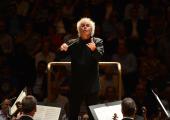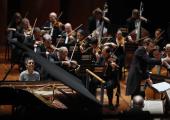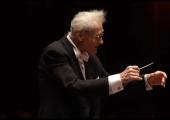Bruckner 6, OAE, Rattle, RFH
Having a ball with a Cinderella symphony
It’s always fun to watch the Orchestra of the Age of Enlightenment. As members of a self-governing orchestra, and often soloists in their own right, the players like to do things their way. Come the ripe second theme of the Bruckner Adagio and the cellos were giving it lashings of vibrato; muesli-wearing adherents to pure tone be damned. So were six of the eight basses ranged across the back of the Royal Festival Hall stage. That just left two basses, left-hand fingers resolutely unmoved.









